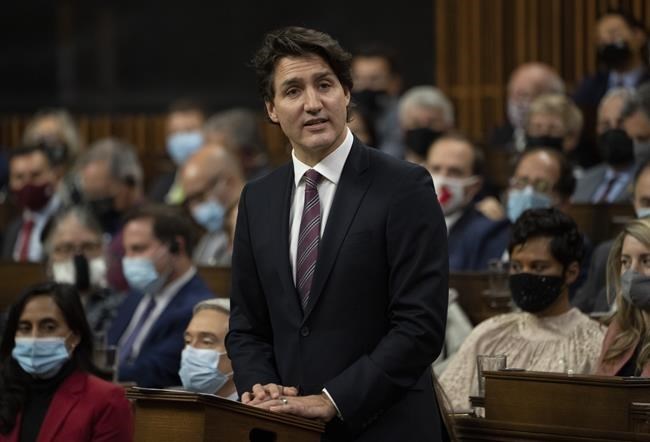
Prime Minister Justin Trudeau speaks in the House of Commons following the election of the Speaker of the House of Commons Monday, November 22, 2021 in Ottawa. Prime Minister Justin Trudeau will outline the agenda for his third Liberal mandate in a speech from the throne today. THE CANADIAN PRESS/Adrian Wyld
Republished November 23, 2021 - 1:26 PM
Original Publication Date November 23, 2021 - 1:06 AM
OTTAWA - Prime Minister Justin Trudeau threw few bones to opposition parties Tuesday in a throne speech that recapped the election platform that produced a second consecutive Liberal minority government.
A vote on the throne speech will be the first confidence test for the government, with the Liberals' survival dependent on the support of at least one opposition party.
Nevertheless, Trudeau made little effort in the throne speech to secure the support of any of the other parties, choosing instead to reiterate in broad strokes Liberal promises to finish the fight against COVID-19 and rebuild a more resilient, fairer, greener economy.
Voter anger over Trudeau's decision to call an election in the midst of the pandemic dashed his hopes of capturing a majority on Sept. 20. He is now evidently counting on that anger to dissuade opposition parties from triggering another election anytime soon, relieving him of the necessity to modify his agenda to satisfy any of them.
It's a gamble that appears to have paid off, at least on the throne speech.
Immediately after it was read by Gov. Gen. Mary Simon in the Senate chamber, Bloc Québécois Leader Yves-François Blanchet signalled his party will support what he called "24 pages of completely empty words."
"Supporting might not be the best word. We will live with this empty piece of paper, gently read in three languages," he said, adding it's impossible to vote against "apple pie."
NDP Leader Jagmeet Singh, whose party is considered the most likely dance partner for the Liberals, panned the speech for failing to even mention his party's priorities, including pharmacare, continuing pandemic supports and boosting annual health transfers to the provinces.
"This is not a speech that looks like they want to work together," Singh said, warning Trudeau not to take NDP support for granted.
Conservative Leader Erin O'Toole said his party will oppose the throne speech, which he lambasted for failing to lay out a plan for reviving the economy, particularly the skyrocketing cost of living.
Despite winning only a minority of seats, Trudeau asserted in the speech that Canadians gave parliamentarians clear direction in the Sept. 20 election.
"Not only do they want parliamentarians to work together to put this pandemic behind us, they also want bold, concrete solutions to meet the other challenges we face," the speech said.
"This is the moment for parliamentarians to work together to get big things done and shape a better future for our kids."
There were no surprises in the speech, which reiterated the promises the Liberals made in their election platform and focused largely on economic recovery from the pandemic.
The pillars of that recovery will be more aggressive action to combat climate change, measures to produce more affordable housing and finishing negotiations with two holdout province and two territories that have yet to sign onto the Liberals' $10-a-day national child care program.
Reconciliation was also a major theme of the speech, delivered partly in Inuktitut, as well as French and English, by Simon, the first Indigenous person to hold the viceregal post.
She opened the speech with her own reflections on the pain caused by the discovery last spring of what are believed to be hundreds of unmarked graves of Indigenous children at the sites of two former residential schools.
"We cannot hide from these discoveries; they open deep wounds," Simon said, adding that "despite the profound pain, there is hope."
Among other things, the speech promised to create a national monument to honour residential school survivors.
Simon also issued a personal call for action on climate change.
"Our Earth is in danger. From a warming Arctic to the increasing devastation of natural disasters, our land and our people need help. We must move talk into action and adapt where we must," she said.
Amid extreme flooding and landslides in British Columbia, the speech reiterated the Liberals' promise to develop the first-ever national adaptation strategy to help Canadians adjust to the changing climate.
It argued that growing the economy goes hand in hand with protecting the environment and that now is the time to "go further, faster" on combating climate change.
It promised to "strengthen action to prevent and prepare for floods, wildfires, droughts, coastline erosion and other extreme weather worsened by climate change."
The speech — delivered to a much smaller than usual audience of masked dignitaries, senators and MPs in a bid to maintain physical distance — sketched only the broad outlines of the government's agenda with few details.
It argued that ending the pandemic "for good" is the best way to revive the economy.
But with employment now back to pre-pandemic levels and almost 90 per cent of Canadians fully vaccinated, the speech reiterated the Liberals' plan to replace emergency benefits that kept millions of Canadians and business afloat during the pandemic with more targeted aid for those hardest hit by the health crisis.
This report by The Canadian Press was first published Nov. 23, 2021.
News from © The Canadian Press, 2021